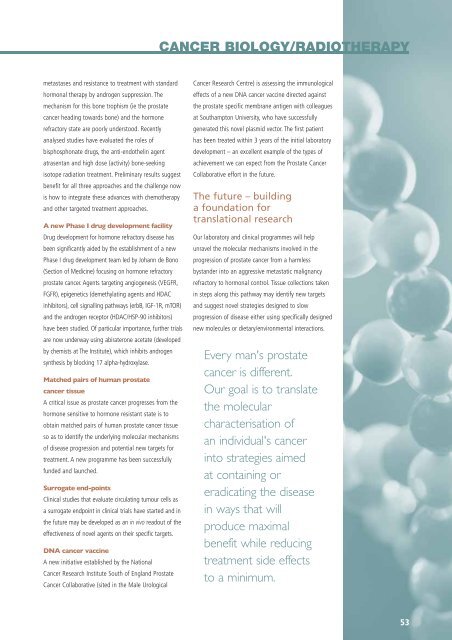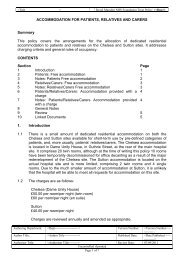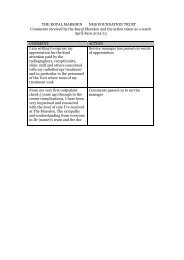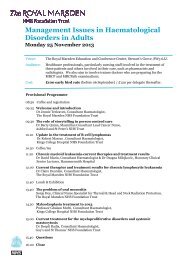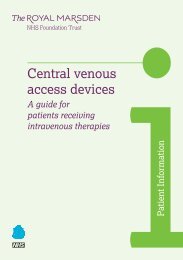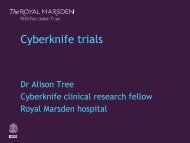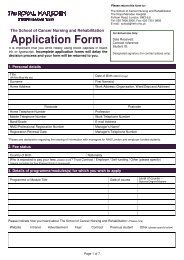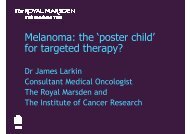Joint Annual Research Report 2004 - The Royal Marsden
Joint Annual Research Report 2004 - The Royal Marsden
Joint Annual Research Report 2004 - The Royal Marsden
Create successful ePaper yourself
Turn your PDF publications into a flip-book with our unique Google optimized e-Paper software.
CANCER BIOLOGY/RADIOTHERAPY<br />
metastases and resistance to treatment with standard<br />
hormonal therapy by androgen suppression. <strong>The</strong><br />
mechanism for this bone trophism (ie the prostate<br />
cancer heading towards bone) and the hormone<br />
refractory state are poorly understood. Recently<br />
analysed studies have evaluated the roles of<br />
bisphosphonate drugs, the anti-endothelin agent<br />
atrasentan and high dose (activity) bone-seeking<br />
isotope radiation treatment. Preliminary results suggest<br />
benefit for all three approaches and the challenge now<br />
is how to integrate these advances with chemotherapy<br />
and other targeted treatment approaches.<br />
A new Phase I drug development facility<br />
Drug development for hormone refractory disease has<br />
been significantly aided by the establishment of a new<br />
Phase I drug development team led by Johann de Bono<br />
(Section of Medicine) focusing on hormone refractory<br />
prostate cancer. Agents targeting angiogenesis (VEGFR,<br />
FGFR), epigenetics (demethylating agents and HDAC<br />
inhibitors), cell signalling pathways (erbB, IGF-1R, mTOR)<br />
and the androgen receptor (HDAC/HSP-90 inhibitors)<br />
have been studied. Of particular importance, further trials<br />
are now underway using abiraterone acetate (developed<br />
by chemists at <strong>The</strong> Institute), which inhibits androgen<br />
synthesis by blocking 17 alpha-hydroxylase.<br />
Matched pairs of human prostate<br />
cancer tissue<br />
A critical issue as prostate cancer progresses from the<br />
hormone sensitive to hormone resistant state is to<br />
obtain matched pairs of human prostate cancer tissue<br />
so as to identify the underlying molecular mechanisms<br />
of disease progression and potential new targets for<br />
treatment. A new programme has been successfully<br />
funded and launched.<br />
Surrogate end-points<br />
Clinical studies that evaluate circulating tumour cells as<br />
a surrogate endpoint in clinical trials have started and in<br />
the future may be developed as an in vivo readout of the<br />
effectiveness of novel agents on their specific targets.<br />
DNA cancer vaccine<br />
A new initiative established by the National<br />
Cancer <strong>Research</strong> Institute South of England Prostate<br />
Cancer Collaborative (sited in the Male Urological<br />
Cancer <strong>Research</strong> Centre) is assessing the immunological<br />
effects of a new DNA cancer vaccine directed against<br />
the prostate specific membrane antigen with colleagues<br />
at Southampton University, who have successfully<br />
generated this novel plasmid vector. <strong>The</strong> first patient<br />
has been treated within 3 years of the initial laboratory<br />
development – an excellent example of the types of<br />
achievement we can expect from the Prostate Cancer<br />
Collaborative effort in the future.<br />
<strong>The</strong> future – building<br />
a foundation for<br />
translational research<br />
Our laboratory and clinical programmes will help<br />
unravel the molecular mechanisms involved in the<br />
progression of prostate cancer from a harmless<br />
bystander into an aggressive metastatic malignancy<br />
refractory to hormonal control. Tissue collections taken<br />
in steps along this pathway may identify new targets<br />
and suggest novel strategies designed to slow<br />
progression of disease either using specifically designed<br />
new molecules or dietary/environmental interactions.<br />
Every man's prostate<br />
cancer is different.<br />
Our goal is to translate<br />
the molecular<br />
characterisation of<br />
an individual's cancer<br />
into strategies aimed<br />
at containing or<br />
eradicating the disease<br />
in ways that will<br />
produce maximal<br />
benefit while reducing<br />
treatment side effects<br />
to a minimum.<br />
53


